Preload degree of stretch - Study guides, Class notes & Summaries
Looking for the best study guides, study notes and summaries about Preload degree of stretch? On this page you'll find 273 study documents about Preload degree of stretch.
Page 4 out of 273 results
Sort by
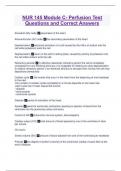
-
NUR 145 Module C- Perfusion Test Questions and Correct Answers
- Exam (elaborations) • 8 pages • 2024
-
Available in package deal
-
- $8.99
- + learn more
Sinoatrial (SA) node pacemaker of the heart Atrioventricular (AV) node the secondary pacemaker of the heart Depolarization electrical activation of a cell caused by the influx of sodium into the cell while potassium exits the cell Repolarization return of the cell to resting state, caused by reentry of potassium into the cell while sodium exits the cell. Refractory periods 1) effective (absolute) refractory period: the cell is completely unresposive to any electrical stimulus; it is incapabl...

-
NSG4330 - Midterm #1 Exam Questions and Answers 100% Pass
- Exam (elaborations) • 16 pages • 2024
- Available in package deal
-
- $12.49
- + learn more
NSG4330 - Midterm #1 Exam Questions and Answers 100% Pass Three Factor Framework - Correct Answer️️ -The Client: degree of complexity and predictability (i.e. teaching vs. ICU), risk of negative outcomes (++ risk factors?) The Nurse: leadership (understanding own competencies/abilities), critical thinking, decision making abilities The Environment: practice supports, consultation resources, stability/predictability of environment Coronary Arteries - Correct Answer️️ -Rt Coronary ...
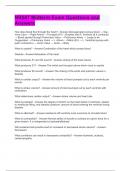
-
NR507 Midterm Exam Questions and Answers
- Exam (elaborations) • 7 pages • 2024
-
Available in package deal
-
- $11.49
- + learn more
How does blood flow through the heart? - Answer-Deoxygenated venous blood → Sup. Vena Cava → Right Atrium →Tricuspid (AV) →Empties into R. Ventricle (& it contracts) → Blood ejected through Pulmonary Valve → Pulmonary Artery → Lungs to be Oxygenated → Pulmonary Veins → L. Atrium → Mitral (AV) → L. Ventricle (pumps with each contraction) → Aortic Valve → Aorta → Body What is systole? - Answer-Contraction of the heart which pumps blood Diastole - Answer-Relaxation...
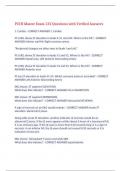
-
PCCN Master Exam 132 Questions with Verified Answers,100% CORRECT
- Exam (elaborations) • 31 pages • 2024
-
Available in package deal
-
- $11.99
- + learn more
PCCN Master Exam 132 Questions with Verified Answers 1. Cardiac - CORRECT ANSWER 1. Cardiac Pt's EKG shows ST elevation in leads II, III, and aVF. Where is the MI? - CORRECT ANSWER Inferior wall MI, Right coronary artery "Reciprocal changes are often seen ini leads I and aVL" Pt's EKG shows ST elevation in leads V1 and V2. Where is the MI? - CORRECT ANSWER Septal area, Left Anterior Descending Artery Pt's EKG shows ST elevation in leads V3 and V4. Where is the MI? - CORRECT A...
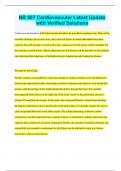
-
NR 507 Cardiovascular Latest Update with Verified Solutions
- Exam (elaborations) • 14 pages • 2024
- Available in package deal
-
- $9.99
- + learn more
NR 507 Cardiovascular Latest Update with Verified Solutions Cardiovascular disorders Cardiovascular disorders are prevalent in primary care. Many of the disorders develop over several years, due to the risk factors to which individuals have been exposed. For each disorder covered in this unit, a discussion of risk factors will be included. For the concepts covered below, clinical application of each disease will be provided so that students can understand the importance of pathophysiology in dia...
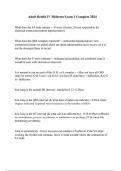
-
Adult Health IV Midterm Exam 1 Complete 2024
- Exam (elaborations) • 33 pages • 2024
-
- $13.00
- + learn more
What does the SA node initiate - - P wave (if none, SA not responsible for electrical conduction) (atrial depolarization) What does the QRS complex represent? - ventricular depolarization (vent contraction) (none=no pulse) (don't see atrial repolarization but it occurs, as it is not the strongest thing to occur) What does the U wave indicate? - indicates hypocalemia, not conductio issue it would be seen with electrolyes (digoxin) Is it normal to not see part of the Q, R, or S complex -...
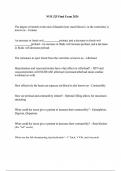
-
NUR 325 Final Exam 2024
- Exam (elaborations) • 21 pages • 2024
-
- $12.00
- + learn more
The degree of stretch at the end of diastole (how much blood is in the ventricles) is known as - Preload An increase in fluids will preload, and a decrease in fluids will preload - An increase in fluids will increase preload, and a decrease in fluids will decrease preload The resistance to eject blood from the ventricles is known as - Afterload Hypertension and vasoconstriction have what effect on Afterload? - HTN and vasoconstriction will INCREASE afterload (increased afterload raises cardi...

-
CCTC NUR 221 UNIT 2: MANAGEMENT OF PATIENTS WITH ALTERATIONS IN FLUID AND GAS TRANSPORT: CARDIOVASCULAR (TEST 2) Exam Questions And Answers (Verified And Updated)
- Exam (elaborations) • 30 pages • 2024
-
- $13.49
- + learn more
CCTC NUR 221 UNIT 2: MANAGEMENT OF PATIENTS WITH ALTERATIONS IN FLUID AND GAS TRANSPORT: CARDIOVASCULAR (TEST 2) Exam Questions And Answers (Verified And Updated) 3 layers of the heart - answerepicardium, myocardium, endocardium diastole: - answerperiod of ventricular relaxation resulting in *ventricular filling* Systole: - answerperiod of *ventricular contraction* resulting in ejection of blood from the ventricles into the pulmonary artery and aorta depolarization- - answerExchange of...
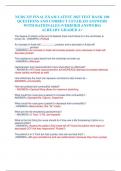
-
NURS 325 FINAL EXAM LATEST 2023 TEST BANK 100 QUESTIONS AND CORRECT CETAILED ANSWERS WITH RATIONALES
- Exam (elaborations) • 14 pages • 2024
-
- $27.49
- + learn more
NURS 325 FINAL EXAM LATEST 2023 TEST BANK 100 QUESTIONS AND CORRECT CETAILED ANSWERS WITH RATIONALES (VERIFIED ANSWERS) ALREADY GRADED A+ The degree of stretch at the end of diastole (how much blood is in the ventricles) is known as - ANSWER>>Preload An increase in fluids will __________ preload, and a decrease in fluids will ___________ preload - ANSWER>>An increase in fluids will increase preload, and a decrease in fluids will decrease preload The resistance to eject blood from ...
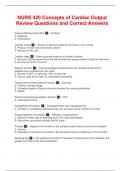
-
NURS 420 Concepts of Cardiac Output Review Questions and Correct Answers
- Exam (elaborations) • 3 pages • 2024
-
Available in package deal
-
- $8.99
- + learn more
Factors affecting blood flow 1. Preload 2. Afterload 3. Contractility Cardiac output 1. Volume of blood pumped by the heart in one minute 2. Product of heart rate and stroke volume 3. Normal is 4-8 L/min Cardiac index 1. More accurate measure of cardiac function 2. Amount of blood ejected from the left ventricle per square meter of body surface area 3. Normal is 2.5-4.0 L/min/m2 Ejection fraction 1. The percentage of total blood in the ventricle at the end of diastole that is ejec...

How did he do that? By selling his study resources on Stuvia. Try it yourself! Discover all about earning on Stuvia


